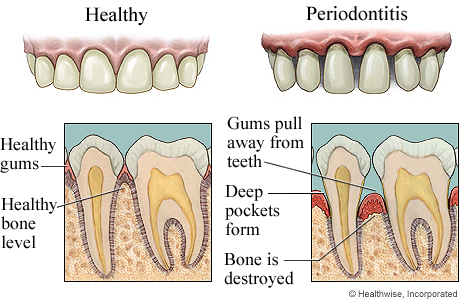Difference between revisions of "Periodontitis"
| Line 1: | Line 1: | ||
| + | Periodontitis means "inflammation around the tooth" - it is a serious gum infection that damages the soft tissue and bone that supports the tooth. All periodontal diseases, including periodontitis, are infections which affect the periodontium. The periodontium are the tissues around a tooth, tissues that support the tooth. With periodontitis, the alveolar bone around the teeth is slowly and progressively lost. Microorganisms, such as bacteria, stick to the surface of the tooth and multiply - an overactive immune system reacts with inflammation.<br> | ||
See also : | See also : | ||
* [[Gingivitis]] | * [[Gingivitis]] | ||
| Line 13: | Line 14: | ||
== Warnings == | == Warnings == | ||
| − | + | Untreated periodontitis will eventually result in tooth loss, and may increase the risk of stroke, heart attack and other health problems. Bacterial plaque, a sticky, colorless membrane that develops over the surface of teeth, is the most common cause of periodontal disease. | |
== References == | == References == | ||
Revision as of 02:30, 17 January 2016
Periodontitis means "inflammation around the tooth" - it is a serious gum infection that damages the soft tissue and bone that supports the tooth. All periodontal diseases, including periodontitis, are infections which affect the periodontium. The periodontium are the tissues around a tooth, tissues that support the tooth. With periodontitis, the alveolar bone around the teeth is slowly and progressively lost. Microorganisms, such as bacteria, stick to the surface of the tooth and multiply - an overactive immune system reacts with inflammation.
See also :
Symptoms
Home remedies
- licorice root is effective against the bacteria which causes tooth decay and gum disease, both of which can lead to tooth loss.
- Acmella Oleracea is employed to treat toothaches and Gum Diseases.
- (Diluted) Tea Tree oil is primarily used in products that heal gum infections and canker sores.
- Apples : We all know the sensation that follows eating an apple – that astringent property, where our gums feel squeaky clean. This is due, in part, to quercetin, which is found in apples, tea and onions, for example. It bears significant antimicrobial properties.Apple polyphenol also protects against periodontal ligament cell destruction associated with Porphyromonas gingivalis, a pathogenic anaerobic bacteria, infection.
- Using Massularia Acuminata stems as chewing sticks may help improve gum health.
Warnings
Untreated periodontitis will eventually result in tooth loss, and may increase the risk of stroke, heart attack and other health problems. Bacterial plaque, a sticky, colorless membrane that develops over the surface of teeth, is the most common cause of periodontal disease.
References
Medical Disclaimer
This information is not meant to be substituted for medical advice. Always consult a medical professional regarding any medical problems and before undertaking any treatment or dietary changes.
